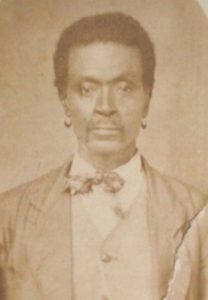
Caesar Bruner
*The birth of Caesar Bruner is celebrated on this date in 1813. He was a Black Seminole Chief and interpreter.
Born in Indian Territory as a free man, he was the son of William and Effie Bruner, both former slaves of Tom Bruner, who had manumitted them. He was born shortly after the arrival of the Seminoles from Florida and would live his entire life as a freedman. In the Federal census of 1900, his parents' birthplace is said to have been Alabama. His wife, Nancy, was born in the Territory, like her father, but her mother was also listed as having been born in Alabama. Bruner and his community migrated to the Oklahoma territory as a result of the Indian Removal Act in 1830.
By the time of the Dawes Commission, he was the elder leader, having arisen since Abraham's death as the Freedmen's spokesperson. When some of the Seminoles left for Mexico to escape persecution, he was still a young boy, and his immediate family would not be a part of that migration. However, after the return of some Black Seminoles to Texas in the 1870s, a "Bruno" family was listed in the Black Seminole Texas settlement that might have had a connection to the Bruner family of Indian Territory. His interviews were also captured in the 2000 Spring Issue of the Frontier Freedman's Journal.
He was called upon to be the voice of the Freedmen like his fellow neighbor, Dosar Barkus, and it was clear that he was respected, as he was never challenged. In many of the interviews, it was also clear that he was an integral part of the lives of the people he represented at the hearings. When asked if he knew the claimants and their deceased relatives, he indicated that he was either there at the time of their death or the burial of said persons. The Bruner band carries his name to this day. Caesar Bruner died in Oklahoma Territory on June 26, 1923.